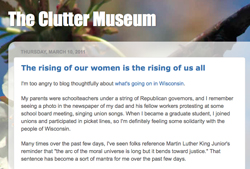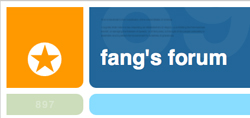As I wrote in an earlier post, this year I’m participating in Marci Glass’s STARward project, in which participants reflect on a word given to them by Marci. As luck would have it, I drew the word calling.
“Calling” would be a good word for me in any year, but it’s especially apt for this year. As I wrote around Thanksgiving, I feel as if I’m once again at an inflection point in my life and career. 2013 is, for me, about completing some projects, letting other responsibilities go, and making space for whatever comes next.
I don’t know if I can articulate my larger calling in a way I’d find satisfactory to me or completely comprehensible to others, but as a bulleted list, pieces of it look something like this:
- I am called to encourage all people to become fully engaged with lifelong learning, by participating more fully, for example, in crafting their community’s historical narratives or in local citizen science projects.
- I am called to open dialogues with people who hold very different beliefs from me, not in the hope of changing minds, but of provoking deeper thought in all conversants.
- I am called to help people become explorers or creators of whatever matters to them, and to help them share their passions with others.
- I am called to various genres of reflective writing, including poetry and essays.
Many who work in education see it as a calling. It is, after all, a fairly irrational pursuit–the pay is middling, the status low to mediocre, and the politics and bureaucracies excruciating. I come from an extended family packed with educators, so one might say teaching is in my blood. I’m not surprised, then, to see all of the above bullets represent some kind of teaching or learning. That does not mean, however, that my calling requires me to be in a classroom, even though I do enjoy planning and leading classroom discussions and activities.
Since arriving at Boise State, the focus of my work has trifurcated into “traditional” historical research on women in the natural sciences, the use of technology in teaching and learning history, and the ways the public understands and practices history in a digital age. All three areas of focus explore the ways people make sense of and express their beliefs about the natural world or the past. To my mind, this is in line with the bullets above.
I have not been strategic, however, in aligning my calling, desires, goals, and actions. Anyone who has read this blog knows that my informal writing tends toward the rambling and disorganized rather than the methodical and carefully argued–and my professional life proceeds the same way, in fits and starts, exploring cul-de-sacs and side streets rather than proceeding down the roads I might once have expected myself to take. And while part of me itches to put down roots and achieve, finally, some semblance of financial comfort, when I really think about my calling, I find it’s less about seeking or even wayfinding in a semi-familiar landscape, and more about trusting myself to make interesting choices as they arise.
When I’m in a reflective frame of mind, I tend to turn to the writings of Friends, who emphasize a variety of discernment based on trusting themselves to see the light and to “proceed as way opens.” In a recent reading of Catherine Whitmire’s Plain Living, I came across William Taber’s tripartite recipe for contemplative listening; the first two ingredients are desire and focus. “And the third,” he writes, “is trust, a synonym of faith, for it takes trust to go out into the deep water; it takes trust to let go and rest or float in the Deep and Living Water of the Stream” (124).
As an academic who has always thought she felt called to teach in a traditional classroom, I’m surprised to find myself admitting that the classroom, academic publication, or tenure may be simply way stations on my journey rather than destinations in themselves. In Let Your Life Speak, Parker Palmer admits he thought the Quaker saying “Let your life speak” meant “Let the highest truths and values guide you. Live up to those demanding standards in everything you do.” Three decades later, he realized in his life the phrase meant something else: “Before you tell your life what you intend to do with it, listen for what it intends to do with you. Before you tell your life what truths and values you have decided to live up to, let your life tell you what truths you embody, what values you represent” (2-3). Palmer discarded the idea he heard at church “that vocation, or calling, comes from a voice external to ourselves, a voice of moral demand that asks us to become someone we are not yet—someone different, someone better, someone just beyond our reach. . . That concept of vocation is rooted in a deep distrust of selfhood, in the belief that the sinful self will always be ‘selfish’ unless corrected by external forces of virtue” (10). This idea that we are supposed to shape our lives to external expectations and values—to walk an prescribed path that conforms to an industry, a discipline, a religion—stymies our development because it limits our ability to understand our calling. “What a long time,” Parker writes, “it can take to become the person one has always been!” (9)
Discovering one’s calling, then, is about discernment. As a scholar, for me “discernment” usually takes the form of sifting through countless documents and other primary and secondary sources, looking for patterns or anomalies as I construct an argument. As a lifelong good student and conscientious worker, thinking about discernment as a process of tuning out external expectations so that I can listen to the quiet voice of self makes me uneasy; I’ve become used to external validation.
In recent months, I’ve been listening to internal and external voices, but trying to turn down the volume on the voices that aren’t mine. Perhaps there’s been too much listening–I’m feeling as if I’ve fallen into that writerly trap of doing endless research instead of starting the actual writing. I must remember that “calling” implies listening, but it also implies a response: call and response.
But that response need not be programmed or predictable.


[…] to reflection, and partly because I’m participating in Marci Glass’s Starward project (my word is calling), I’ve been thinking about both values and the qualities I’d like to have more of in my […]